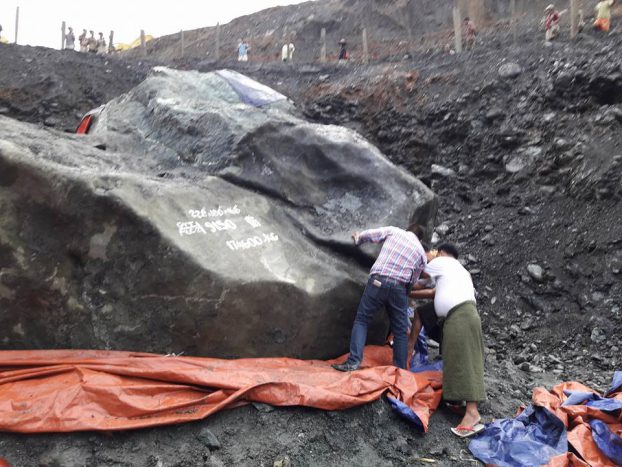A massive slab of jade – said to weigh 210 tons, which would make it the largest piece ever found in Burma – has been unearthed from the Hpakant jade mines in Kachin State.
Tint Soe, Hpakant’s MP in the lower house of parliament, said, “The slab was discovered some time back, but it took until two days ago to dig it out. Its weight was calculated at 210 tons upon discovery; however the top broke off during the excavation involving heavy machinery – that was about 40 tons worth – so the slab itself now weighs about 170 tons.”
The massive piece of jade was detected at a site operated by the Yadanar Taungtan Company in a joint-venture with the Ministry of Mining.
The gemstone jade comes in two distinct minerals, jadeite and nephrite. Of the two, jadeite is the rarer and harder stone, making it more valuable and suitable for intricate carvings and jewellery.
According to the International Gem Society: “The finest jadeite originates from Myanmar [Burma].” This translucent emerald-coloured variety is also known as “Imperial Jade”.
Assessing and pricing jade is reported by gems experts to be a complicated business, and values often depend upon the eye of the beholder. Jade was prized among Mayas and other Meso-Americans many centuries ago, but it is in China where true values exist nowadays, and where collectors have celebrated jade since even before the times of Confucius (551-479 BC).
According to a Forbes Magazine article from 2010: “The price of the finest jade has increased tenfold over the past decade, to US$3,000 an ounce, making it far more valuable than gold.”
A report by international rights watchdog Global Witness estimated the 2014 value of Burma’s entire jade production at a staggering $31 billion.
In September this year, Global Witness further called for a restructuring of Burma’s jade industry in order to release it from the grip of military elites, drug lords and crony companies.
Human rights groups have long decried conditions for miners in Hpakant. A series of landslides has killed dozens of workers, the latest incidence being in May this year.
In June, a Myanmar Now report included an estimate of 300,000 migrant workers having come from across Burma to scavenge through mining waste in the hope of finding jade stone.
Almost the entire production of jadeite from the rich veins of the Hpakant mines ends up in China, either legally through government-sponsored gems emporiums, or illegally smuggled across the Burma-China border.
[related]
In July, DVB reported that at this year’s annual gems fair in Naypyidaw, some $592 million in proceeds was made, of which jade accounted for $584 million.
The trade in Hpakant’s jade has been hampered in recent years by armed conflict between the Kachin Independence Organisation and Burmese government forces, and clashes continue despite the new leader of the government, Aung San Suu Kyi, taking over the reins of the peace process by fixing a series of ceasefire negotiations with ethnic armed groups.
Last week, the US government lifted its remaining sanctions on Burma, a move that includes ending a ban on the import of Burmese rubies and jade into the USA.



